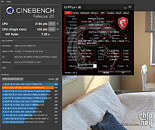Tuesday, May 12th 2020

Intel Core i5-10400 Tested, Significant Multi-Threaded Performance Gain Over i5-9400
Intel's upcoming Core i5-10400 processor, priced at USD $184, with an iGPU-devoid i5-10400F variant priced at $157, could be a serious mid-range price-performance package, building on the popularity of its predecessors, the i5-9400F and the i5-8400. The new chip is 6-core/12-thread, with 12 MB of shared L3 cache, or a similar die configuration to the 8th generation Core i7 series. The chip has the same 2.90 GHz nominal clock as the i5-9400, but increases the max Turbo Boost frequency by 200 MHz to 4.30 GHz.
A PC enthusiast on ChipHell, with access to an i5-10400, tested it on an MSI MAG Z490 Tomahawk motherboard, and compared its performance with the i5-9400F. Among the strictly-synthetic tests are Cinebench R15 and R20, various forms of CPU-Z bench, and SuperPi. The processor posts a tiny 2-5% performance gain in single-threaded tests that scale perfectly with its 4.8% higher max boost frequency (4.30 GHz vs. 4.10 GHz on the i5-9400F). It's the multi-threaded tests where the i5-10400 comes alive, thanks to HyperThreading. It posts massive 35-45% performance gains with CPU-Z bench multi-threaded; a 41.85% gain with Cinebench R20 nT, and 45.05% gain with Cinebench R15 nT. This would bring the i5-10400 within 10-15% of the Ryzen 5 3600X in multi-threaded Cinebench tests.
Sources:
ChipHell Forums, VideoCardz
A PC enthusiast on ChipHell, with access to an i5-10400, tested it on an MSI MAG Z490 Tomahawk motherboard, and compared its performance with the i5-9400F. Among the strictly-synthetic tests are Cinebench R15 and R20, various forms of CPU-Z bench, and SuperPi. The processor posts a tiny 2-5% performance gain in single-threaded tests that scale perfectly with its 4.8% higher max boost frequency (4.30 GHz vs. 4.10 GHz on the i5-9400F). It's the multi-threaded tests where the i5-10400 comes alive, thanks to HyperThreading. It posts massive 35-45% performance gains with CPU-Z bench multi-threaded; a 41.85% gain with Cinebench R20 nT, and 45.05% gain with Cinebench R15 nT. This would bring the i5-10400 within 10-15% of the Ryzen 5 3600X in multi-threaded Cinebench tests.



45 Comments on Intel Core i5-10400 Tested, Significant Multi-Threaded Performance Gain Over i5-9400
Again, it is time to readjust your view on this, half of what you're saying is yesterdays news.
Ill leave this here, this is comparable to the 10400/F but I guess otherwise i'm wrong for gaming performance
Tuning, BIOS, all your words...not mine. All escapes to deny the obvious truths laid out before you in terms of good or bad purchases.
Keep in mind that the games tested by sites are usually the well-threaded ones - Assassin's Creed Odyssey, Battlefield V, Division 2, Total War etc. This is not the case with majority of games. The new gen will remove the current Ryzen advantages based on more threads.
I don't really get your point on how the 10400 having a more refined core magically lowers temps so much that their stock cooler will sufice?
Point is:
If 10400F is going to be faster than a 3600 you must use a Z-MB and better cooling, but then price is higher.
If 10400F is going to be cheaper or same price performance will be worse due to cooler and ram. If you buy 3000 or slower ram and do no tuning on 3600 then 10400F will probably win most times.No, buy cheap Crucial with Micron E-die, they easily do 3733cl15 on ryzen 3k. 80usd. B-die is sligjtly faster, but much more expensive.
As for the mentioned thread count @londiste , yes absolutely. But we're also seeing examples where Zen runs better than the Intel alternative and let's be very honest, how many games today are still single thread limited on recent CPUs? And what actual limit are you talking about; a few max. FPS or a consistently lower average...
I was testing with a pretty average 3200CL16 kit.Are we seeing examples where Zen runs better on technically equal alternative not cost or market placement alternative? If Zen has more threads there are obvious benefits for certain games. Even in gaming tests run at the same frequency Zen2 is barely catching up to Skylake-ish.
Common testing is with average. 0.1% or 1% is hell to test at home except for ingame benchmarks that return these values.
Edit:
3300X is probably where Zen2 can shine over 7700K but this is also a pretty rare case where Zen2 has a frequency advantage :)
Anyway, I was just saying you gotta spend extra $$$ to extract the maximum of either platform. Mind you, it's not the same as spending the extra $$$ to buy a Turing card. For a mid-range CPU, you get _a lot_ of value in return. Plus if you get a 6c/12t CPU today, it will last you 5 years easily.
The point initially I was going to make is not by any means that one should NEVER ever buy Intel again in this direct comparison of i5 versus Ryzen 5; but the argument 'Intel is still better for gaming' is becoming a smaller niche by the day, and it is good to realize that. Overall, these CPUs perform pretty much the same, really, and victories go both ways, instead of exclusively towards Intel.
AMD: More bang for bucks.
Intel: More performance for more bucks.
Eagerly awaiting the ryzen 4000-series which judging from the 3300X looks real promising :)